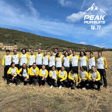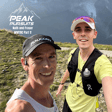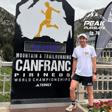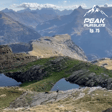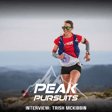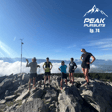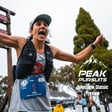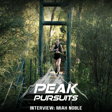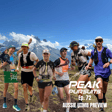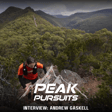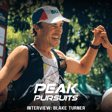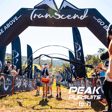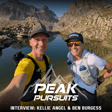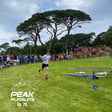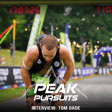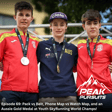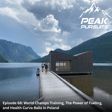Introduction to Hannah McRae's Trail Running Journey
00:00:34
Speaker
Hello and welcome to the Peak Pursuits podcast. My name is James Sieber and today we welcome Hannah McRae to the show. Continuing the World Mountain Trail Running Championships interviews, Hannah is doing the long trail course at Canfrank in what is her first time representing her country in trail running.
00:00:52
Speaker
As you're going to hear about in the podcast, Hannah's results date back all the way to 2016 and have an extensive list of very impressive finishes, including a second place at Tarawara, 100 mile, 23rd at UTMB last year in what is a historically fast time and would have been a top 10 in multiple years not that long ago, third at Buffalo Stampede this year, and she's just coming off a 10th place finish at Lavaredo, which was the end of her honeymoon over
Balancing Veterinary Career with Trail Running
00:01:21
Speaker
Hannah's experience in the sport, her drivers, also balancing her life as a vet and the shift work that I'm sure a lot of you listening to this also have to manage is really interesting, captivating and inspiring for what you can do when you just put the work in year after year after year and do your best to stay consistent, pursue events that you're passionate about and work diligently towards your goals.
00:01:44
Speaker
Before I go on saying any more about the episode, I reckon we just get straight into the interview with Hannah McRae. Hannah, welcome to the Peak Pursuits podcast. How are you going today? I'm good, thanks James. How are you? I'm very well, thank you. You're just telling me offline that this is coming off night shift for you, so probably a bit more awake than potentially you feel, so I do appreciate you getting up early to do this.
00:02:05
Speaker
No, um thanks thanks so much for having me. It's um really yeah really awesome to be on the podcast, thank you No, you're more than welcome. it's Your name has been one that I've been really interested to talk to. I think I probably came across you and started paying more attention over the last 18 months. And then I look back at your running history and and there's quite a few really cool and very impressive results in there. So I'm excited to learn all about that. Before we do, though, we've never actually met in person and spoken. So I'd love the opportunity just to get to know you a bit more outside of running. Like, who is Hannah? What do you do?
00:02:38
Speaker
Oh no, thank you. um Yeah, outside of running. Okay, I am i'm a vet um as well, so that takes up a fair bit of my time outside of running and balancing the two is always um a bit of a challenge like anyone's work, but um yeah, the the work can be a little bit more irregular sometimes, I guess, with on-call or shift work.
Life in Tasmania and Career Path
00:03:01
Speaker
um I live in Tassie at the moment, um but I've moved around a few places over the last sort of eight years. um And so at the moment we're living in Hobart, which is a really awesome place for trail running um and for actually having a mountain, Mount Wellington out my back door.
00:03:18
Speaker
um Yeah, I think that's... And then running takes up a lot of the rest of the time, to be honest. Yeah, but that's that's totally fair enough. Growing up, were there any other sports that you were into?
00:03:31
Speaker
and Not as seriously... Not seriously. I played a bit of soccer, um but I'd always run from pretty much when I was a really little kid, like I think my parents put me in little A's probably just to burn off some energy. Yeah.
00:03:45
Speaker
And um then I did with casual soccer, softball, but I could never hit the ball, country running through high school, a tiny bit of athletics, mostly because no one else wanted to run the 400 in my age group.
00:03:58
Speaker
And I'm trying to think of other sports. and Touch footy socially, like occasionally. ah Yeah, cool. Yeah, mostly running. Running backwards in touch footy is really hard.
00:04:09
Speaker
yeah yeah Yeah, we used to do that in rugby quite a bit. is is and It's interesting. where Where is home for you originally? who um I grew up in Sydney mostly. um couple of years we lived overseas in France and Belgium, which was um when I was about 8 to 12. So that was pretty cool, but mostly in Sydney and then did um vet school, obviously. The um last year or two of that school takes you out to a bit more country areas, either on placement or for our ah sort of large animal studies for a year in Camden, which is so south of Sydney, southwest.
00:04:43
Speaker
um And then I moved to Armidale for five years, which is still kind of a bit home for me just because I was there, I think, for kind of formative adult years, first five years of ah working life as well.
00:04:55
Speaker
um lived in Tamworth for two years after that, and then I've been down in Hobart for a year and a half. So i don't really know, but I kind of say Sydney slash Armidale. Wow.
00:05:06
Speaker
Okay. Yes, you have moved around lot. Going across to Europe, you said from when you were eight to 12?
Cultural Experiences and Language Learning
00:05:11
Speaker
Yeah. That would have been a really, i guess, fun and a very different experience, very different culturally. how Do you you remember much from back then?
00:05:18
Speaker
Yeah. No, it was like, I think back now and I'm like, that's pretty incredible opportunity that we had. um and also pretty impressive that my parents with kids aged, I think we were eight, six and three when they left, were like, yep, we're gonna take this opportunity and move overseas.
00:05:34
Speaker
um So, yeah, no, it was amazing. We were in the south of France for about a year and um sort of kind of semi-rural France. So learned to speak French just by necessity and by being a child that's just easy. Like ah remember struggling a little bit with the language at first, but I also don't remember it being that hard, I guess, to learn the language because when you're that young and you just kind of absorb it, you don't have as much of this fear of like, I'm getting the words wrong. And so you just...
00:06:05
Speaker
learn a lot quicker than I think and than when you're an adult. um I thought I'd forgotten a lot of it until I went back last year. ah i was like, oh, I can still understand but my speaking is not great anymore but it comes back to you pretty well.
00:06:18
Speaker
um And then Belgium for three years after that as well which was, yeah, really, really cool and went to different international schools, met a lot of people from lot of different countries in the world and that sort of Again, when you're a kid, just kind of whatever's around you becomes normal. So i was like, oh yeah, it's normal to be able to like visit all these European countries and all of my classmates come from all over the world and stuff. And um yeah, we got moved back when I was about 12 and then lived in Sydney there until I graduated and went to vet school basically. Wow, that's an incredible experience.
Veterinary Practice and Work-Life Balance
00:06:54
Speaker
um Going into being a vet now, and this, forgive my ignorance, I'm assuming there are different types of veterinary practice that you can do. So what type of vet are you now?
00:07:05
Speaker
um At the moment, I am doing predominantly emergency work um in a sort of 24-hour emergency hospital. um In Hobart, I would have been previously more of a rural vet, I guess. So in Armadale, I did what we call mixed practice, which is a mix of large animals and small animals.
00:07:23
Speaker
um And then in Tamworth, was still a rural vet, but um at a clinic that did predominantly small animals and did a bit more, not specialist, but like sort of second opinion referral practice because we had a CT machine, which is not common in every other vet practice, especially not in the country.
00:07:40
Speaker
um And yeah, so yeah, down here I'm doing predominantly emergency work, a little bit of GP work. um But yeah, i really like the variety and the fact that you can do different things with it. And um yeah, I think it really ah keeps my brain entertained. and i I was this the sort of person as as a lot of vets are, not everyone, but um who like I wanted to be a vet from when I was a kid.
00:08:05
Speaker
yeah was brief periods of thinking maybe I do this, that or the other in high school. But when it came down to it, when I got into vet school out of yeah add high school, I was like, no, I'm going, that's it.
00:08:17
Speaker
but That's the career we're done. So that's a pretty common process for people who become vets to be like that. I think it's a bit of a cliche, yeah, of like, oh, we always wanted to be a vet from when we were little. And I know for, um again, like not all of my classmates, but but yeah, there's this's certainly a reasonable number of us who, yeah, there's the photos of us as little kids of like, yep, we're doing it with our dolls pretending to be a vet.
00:08:43
Speaker
um And yeah, like I think, but yeah there's lots of people come to it for other reasons later in life that they want to combine medicine with animals or all sorts of reasons. I feel like as a dog and cat owner, it's nice to know that the people looking after your animals have like, it's been part of their life for so long and they obviously care so deeply about it.
00:09:04
Speaker
The different roles you've had as a vet working small, large emergency, is there a type of practice that you have felt more drawn towards? Oh, it's tricky.
00:09:15
Speaker
um I think at the moment i was surprised by how much I was drawn to the emergency practice. I really do enjoy it. I guess it was still a part of practice, like my whole working career, because in rural practice you are the emergency clinic as well as um the everything clinic, yeah ah just because there's not that access to 24-hour practice.
00:09:38
Speaker
open big hospitals when you're living in the country. um But I also really like living rurally and i I really value like the, I think the rural vet practice I think is a really important thing as well. And I think part of my um love of emergency and like love of learning more about it at the moment is that I really want to be able to take that back to rural practice is what I learned from a bigger emergency practice back to smaller rural practices in as far as that's practical.
00:10:05
Speaker
um Yeah. But yeah. And moving down to hobart was it work that took you and your now husband Gerald down there? Yeah, well, work and I guess like trails as well um because i get he is and training to be a rural ah doctor and um his sort of area of training is more an emergency emergency clinic work for rural I guess, to again, take that back to rural hospitals. um So he's training at the Royal here.
00:10:36
Speaker
um ah say training, he's a doctor, but they're training forever, basically, I think, as far as I'm aware. um But yeah, so he we had different options of where we could go, but um yeah, he got a job down here that worked for the training program and we loved Tassie and we thought, yeah, let's take the opportunity and go spend a few years in Tassie.
00:10:57
Speaker
And how are you finding living down there compared to being more rural?
Adapting to Rural Life and Climate
00:11:02
Speaker
It was a bit of an adjustment the first year, I reckon. Like, well, maybe not year, but like just we'd both, even though I grew up in Sydney, I think I feel more comfortable in rural areas. He's grown up in a country town ah mostly and again, then went to uni in Sydney and there for lots of years but um Hobart's not a big city by any means but it it thinks of itself as a city so it's a bit of an adjustment just like I guess it's when you move to a rural town it's it just seems sometimes a bit easier to meet people like you go to the park run once you know some work colleagues take you to work and then you've met
00:11:37
Speaker
plenty of people you've met you've met half the town yeah yeah obviously there's kind of moving into the training world now but whenever I will speak to somebody that is on shift work and especially if you do have nights within that not just balancing it with training but also just how it impacts your life like how have you worked to sort of cope with that and and manage I think it's just trying to be flexible with moving things around in the week. Like it's ah like shuffling things around and then also just taking the easy days or the rest days in between.
00:12:13
Speaker
ah you've got really big blocks or really big shifts or you just have a shift that runs over time and was really chaotic, like being okay to take the rest yeah afterwards and because there's just no point well at least for physically for me it feels like there's not much point in beating a dead horse when you are um wrecked and then also just i guess yeah like it's like anything like i've liked we've got animals but not kids like I know people have got to juggle that and I think that would be a lot more unpredictable so um yeah I think previously working on call was a lot harder because you could maybe fit in a run but you'd have to stay really close to the clinic so i used to do a lot of runs that were just like laps of a block near my house um when I was call rather than working shift work um
00:13:03
Speaker
And that was ah like, I think a lot more tiring. You could be woken up by the phone multiple times in a night, even if you didn't have to go in and then you're working a full day the next day afterwards.
00:13:14
Speaker
ah but But Vetland's not particularly figured that one out yet of how to like um do the on-call and the day work. We just kind of do it in real practice and yeah, something something we need to work on, but yeah.
00:13:29
Speaker
And do you reckon you guys will be down there for much longer? I'm not sure. so it's, yeah, still in the process of working out next year's, where we'll be next year at the moment. Yeah.
00:13:40
Speaker
Okay. So potentially only another six months, but it could be yeah much more. Yeah. We do really like it down here though. So yeah. How have you found – know you you were away obviously for June, but how are you finding winter down there? Oh, Armadale where I lived first is actually up at 1,000 metres and it's freezing up there in winter.
00:14:01
Speaker
um So we were in Tamworth for a bit, which wasn't quite as ah freezing of a winter. But, yeah, it's I think the dark is the worst thing down here because you're so far south that you do – it's dark until – 7.30, quarter to eight in the morning at in the worst of the winter here, which yes, you wake up and you're like, what is going on? Why is it why is the sun still not up?
00:14:24
Speaker
um And then, you know, dark again at like 4.30, quarter to five in the evening. So I found that the most challenging, probably more than the cold, although I don't love the cold either. um But then you get the opposite as well. You get the long summer days and that's awesome. You get so much light in summer. Yeah.
00:14:40
Speaker
It sounds very similar to back in England and we went back this July and I forgot how long the days were and how nice it is that you wake up at four and it's sunny and it's still sunny at
Passion for Trail Running and Early Races
00:14:51
Speaker
nine o'clock. wow I have so much time my day. Yeah, yeah it's amazing.
00:14:55
Speaker
When i was doing the research on you, was looking at your UTMB post from last year and you mentioned in there that your dad had told you that you were talking about UTMB back when you were in high school. So yeah this whole world has obviously been a part of you. and You said that kind of running was probably the the more of the main focus growing up from sport perspective.
00:15:15
Speaker
Do you know what it was back then that interested you in the world of trail running and specifically like ultras? I think back then it was probably more just that it had this law of like the longest run. I don't think I was super cognizant of like trail versus road in high school. I don't know if that just comes from like I did cross country. And so ah didn't think of it as trail running, but cross country, like we would train on the road, but then you'd go to the park and train there. And the races were obviously, know, parklands or something like that.
00:15:48
Speaker
um And I always knew that I was a lot better at the longer stuff. um like sort of more endurance stuff like I gravitated towards 10ks and half marathons in high school really wanted to do a marathon before I graduated um I think yeah my parents were like no I finished growing turn 18 I think I finished growing at 14 but anyway but looking out for me wanted to make sure all the bones and joints were done growing and wanted me to wait till I 18 first which is fine um But, yeah, so I think and I just knew about it as, yeah, it's this famous race. I knew was really, really long and had this kind of lore about it. And I think I just thought if that's if that's the biggest, longest, like most incredible race overseas, ah like maybe I'd like to do that one day.
00:16:37
Speaker
i think I think maybe that's about as complicated as it was. and But I would be surprised if it, 16 17 18 would be more complicated than that having like listening to you say that my my my thoughts immediately go to is is that still the way you think about running and like are 200 milers or backyard ultras does that sort of thing or long trail fkts interest you Yeah, I think backyards are an interesting one psychologically, and I'm still not sure if I want to give that a go or not, but um definitely like the longer longer stuff.
Interest in Extreme Endurance Events
00:17:11
Speaker
And FKT is definitely still in the back of my mind about like not not anytime soon on the horizon, but as a like, oh yeah, one day that would be really cool to to give a go for sure.
00:17:22
Speaker
What makes you say not anytime soon? I only ask that because we're seeing people younger and younger and like earlier in their careers taking these on like Dan Green who won ah Coca Donut is yeah in his prime.
00:17:35
Speaker
Is it yeah a time to train for it or you just you feel like you're not ready for that? Maybe a little bit not ready. And also I just think at the moment I'm enjoying racing the, shall I say more conventional distances?
00:17:47
Speaker
I don't know. Just everything a hundred miles and down yeah as the quote unquote more conventional. Yeah. I feel like we're quite accustomed to up to the hundred mile distance. That's somewhat normalized, especially in our circle. I've,
00:18:01
Speaker
so absolutely The 200 miles. It's scary how normalized it is. And then you've got remember to think about it as, oh, actually, this is actually insane. It's good to be around normal people in that regard as in non ultra runners.
00:18:13
Speaker
Mm-hmm. where they say things like, I don't drive that far. Yeah. Yeah. You get that that realization. Even speech people and like running a sub 25K, for example, is something that quite a lot of of runners that run often, a frequently few times a week aim for. But the reality is that that is like a very small subset of the population that ever gets close to that.
00:18:34
Speaker
And we kind of forget that whole context. Yeah, for sure. And when I was at the start, looking back at all your results, it looks like aside from something called the upstream challenge in 2014, which looks like a road thing that you maybe did, I may in the wrong place. not trying to remember what that was.
00:18:53
Speaker
It's like a 50K in Melbourne that looks like it's on the... Oh, no, that's not me. Wait, 20... 2014. Sometimes he's these draw random stats. I think that's me. That's fine. We'll skip that one.
00:19:05
Speaker
um But it it looks like sort of six foot was the first trail race for you. um That was, yeah, 2016 back in March. So you've been doing this for nine and a half years now, essentially.
00:19:20
Speaker
Reflecting back on those races, is there anything that really stands out to you, like a particular run you're proud of or you learn stuff from? I think getting, when I got into it, I really, like, i'm those first races of, like, I did six foot and then I did UTA 100 that first year.
00:19:34
Speaker
the six foot was planned. The UTA perhaps not so pre planned. But, um yeah, I think those first two, like, definitely stick out my mind as being, like, I was really, really proud of,
00:19:47
Speaker
Just give being willing to give it a go and getting into it and then being able to discover how much I loved it from there. yeah And then same thing with my first like 100 miler. Like it was that sort of scary thing which I did in Tauera.
00:20:00
Speaker
um I still can never say that right. I'm so sorry, QE's. um But I love that event. But, yeah, had a like that was that was a really big, brave run for me and I had an amazing experience.
00:20:13
Speaker
time and an amazing race until the legs gave out with about 15 k's to go but um yeah I think the first few events of uh yeah giving it a go and stepping up to big distances like definitely stick out my mind of just being proud of former me for giving it a go yeah the tower run where you you came second back in 2018 there's nothing else after that at least that I can find did that race take quite a bit out of you Um, yeah, it did definitely, but I was still like keen to go back into it. i
00:20:50
Speaker
try to think 2018. I got, I think I got back into it by, ah no, that's right. I had a, I had a calf injury that I didn't know what it was. And I don't know even, I still to this day, don't know if it came directly after the race. Cause it didn't really show up until the May, whereas in February, um, and that took me out for about six months and it was a bit in, in,
00:21:12
Speaker
We eventually figured out it was probably a little calf tear that then triggered a nerve problem, irritation. um But we went through a bit of a diagnostic um run around. It was a bit weird to figure out, which was my fault of not knowing my own body as well. But they that took about six months to heal, by which time I think I sort of spent 2019 building back up. I did BTU in 2019.
00:21:35
Speaker
b to in twenty nineteen 100K and I had did a couple of other races.
Impact of COVID on Veterinary Services and Training
00:21:41
Speaker
Felt like I was gaining momentum back really well throughout 2019 and then obviously 2020 hit and um for for everyone, but particularly the vet profession was I think everyone got a pet in COVID.
00:21:53
Speaker
um We didn't get thousands of more vets in COVID. So work was fairly chaotic for a few years there and I just really struggled to get enough consistency and momentum in training.
00:22:07
Speaker
to, yeah, to to do the ultra distances and to enter events. And so I kind of declared myself semi-retired for a few years there until I inevitably unretired.
00:22:19
Speaker
that I've never thought about that because we saw such a boom in pets over COVID. I remember the price of buying a dog just got absolutely ridiculous. yeah, crazy. did Was it quite different working as a vet then? Were you seeing different things or animals potentially being sort like, don't know, not looked after as well?
00:22:39
Speaker
Oh, no, definitely not not looked after. If if anything, um so I guess there was maybe one half of it being people got new pets and two people were home more so they would pick up on stuff with their pet. Oh, you know, he's actually got that lot. So we were seeing people who already had their animals probably a little bit more as well and they they're also, they're at home.
00:22:59
Speaker
ah work Everyone was working from home so they could come in at any time in business hours. But also I think, There was a little bit of a like a COVID dog phenomenon where you know we weren't allowed to leave the house, neither were the dogs. so you ended up with a ah small generation of dogs that were not perhaps not as well socialised and a little bit more scared of life.
00:23:20
Speaker
um That's, yeah, I think it's probably... the main thing and working. Yeah. it was just busy and then trying to keep the team safe. And there was times where we were doing car park consults and wearing masks, um, that, all that sort of thing.
00:23:34
Speaker
I found some of the dogs actually really were a bit scary of the fearful of you when you're wearing masks, even if their owners, cause they wouldn't have seen their owners wear masks yeah at home. And so they're like Oh my God, who is this? Why why do you look so weird?
00:23:47
Speaker
Yeah. yeah I'll we have a stag hand and he was definitely like that for the first few times I just could not even looking at me with a mask on it was just freaked him out he got used to it but just be so different for them I assume um the just going back to sort of your first events were you training for running at that point or was this just about kind of being out there Um, no, it was definitely training for
Community and Love for Ultra Running
00:24:14
Speaker
running. I was after school and cross country teams. I joined a running club in Sydney called Northside Running Group, which is in North Sydney. And, um,
00:24:25
Speaker
six that was That club was sort of founded on six foot track. Six foot was a big part of that club's sort of culture and and year calendar. um So ah that kind of put it on my radar and wanted to do it for ages. Finally had the opportunity to do it in 2016.
00:24:40
Speaker
um So I trained all through the summer of 2015, 16. for six foot. um And then I guess just got to know a lot of people really well, had a lot of friends who were on those training runs every Saturday. um And a bunch of them were going on to do UTA 100. Some of them had done it before, a bunch of us were first timers. And I kind of just got pulled along with that group and I at the time was like oh I can't commit to doing it because I was really in my final crunch year of uni but um I think with like three and a half weeks to go i'd been training for it as though I could maybe do it but still thinking oh I can't can't do it can't afford it as well because I couldn't like buy all the gear but with like three weeks to go that one of the ladies in the club
00:25:25
Speaker
got an injury and she sold me her entry at like half price if that lent me all of her gear and I ran the whole UTA 100 my first one with a friend who I'd been training with we ran the whole thing together had a really just a really cool time out there really enjoyed like we're yeah ah that that run still sticks in my brain a lot as as a really special special event and I think that's what set me on loving it and wanting to do more of it because I just, it was such a ah beautiful experience. And yeah, we had a, ah like, it was tough, really, really tough. I remember that part too, but like, it's just really special to get to do it with someone like that.
00:26:03
Speaker
yeah yeah it's nice hearing that quite often when they ask someone to recall a race from say 2016 they sort of look at me with a blank stare and go okay wow let's that you can see this one has right yeah that there'll be some blanks yeah that one out but you can see this one really has stayed with you it means something yeah for sure So obviously you did Tower Era, that's your first 100 in 2018. Again, when I'm looking back at your your results, there is very little that's not under 50k. So as in most of them are ultras.
00:26:38
Speaker
Yeah. Bringing kind of us up towards, say, the start of 2025, when you did Gone Nuts, how has your running and work and kind of everything else moved with with you to to to
Training Adjustments and Strategic Racing
00:26:52
Speaker
I think, yeah, this year and last year, definitely. I've um just through, we've moved down here and I'm working, instead of working on call, um working a bit more shift work and on bit more casual contracts so I can have a bit more control over things. It's allowed me to um try and put more running in the priority balance um and and be a bit more consistent.
00:27:16
Speaker
ah So I think that's definitely shifted. But I've always gravitated towards the longer stuff, like for me, which is like it's I realize it's ridiculous to say this, but fifty k is like the sprint distance for me. And 100K still, depending on the course, feels like a kind of like a fast sprint.
00:27:37
Speaker
race, I guess, if that makes sense. yeah But I think it's also the way that sport's evolving with just crazy speeds as well. Definitely. ah Something that i noticed when I've been looking back at your splits through races is that you definitely seem to be coming through the fields. And even when i looked at at Buffalo, you were closing in on Brydie quite quickly in those last sort of 30k. And it looks like if the race had been 120, would have been sort of starting to really hit your stride then yeah i definitely feel like honey yeah 100 i am ah usually stronger in the back end of races which is great but i also feel like i often don't have the best either start or middle or both um
00:28:20
Speaker
La Veradeo, which I did while we were over, I sort of tacked that onto the end of our honeymoon trip. um It was a bit different because I didn't feel great, but i think that was just the altitude, the last third of it, you're up at really high altitudes.
00:28:33
Speaker
um But, yeah, most races I definitely feel like I'm coming through coming through well at the end, which is, I think, part of why I enjoy the longer races, because I know I will hopefully be able to do that in the back half of the race and yeah make up some ground and, yeah.
00:28:51
Speaker
I'm not very interested. I'm very interested to hear about Lavereda. So I'm going to come back to that shortly. But looking back at your results, like you've you've already said, you've had a second at Tarawara 100 mile in 2018, you're fourth 2023, second at COSI 100K in 2023, 23rd at UTMB, which like when you look at the number, but someone outside the sport might not mean me much, but that's a pretty awesome result, I'd say. you.
00:29:17
Speaker
And then this year, you sort of had the first at Gondon, third at Buffalo, and then 10th at Lavarado. Looking back at those results, is is there anyone that you kind of feel was a I don't want to say breakthrough, but just like a step up for you?
Achievements and Challenges at UTMB 2022
00:29:30
Speaker
Oh, UTMB for sure. um in In ancient times, 2018, like definitely that miler I think was – um like the when I yeah I really wasn't expecting to come second there and and so that at the time was really i was like I guess opened my eyes a bit to um maybe I could have a competitive pretty competitive crack at things but then there was big sort of big gaps from there um but yeah definitely UTMB like I think that's
00:30:02
Speaker
100% the race I'm most proud of and the race um that I think is my best performance, even if UTMB scores don't don't have it as such. i always think that's really funny when because i' have like ah that's 100% I feel like my best performance um that I've had, I think, that I'm most proud of as well.
00:30:22
Speaker
yeah What about that race is makes you feel like it was your best? It's just such a big, epic challenge and i really went into it with that mindset of like, this is a big, this is just a big epic challenge. And where like the goal is to not just to get it done, but yeah, like to, to experience it, I suppose as well.
00:30:45
Speaker
Um, but then I also really, ah did have like time goals, but i ended up under what I thought I could do. i think i thought I was, setting an ambitious goal of like if i if the day went really well, I would like to do about 30 hours or just crack under 30 hours. So I was really stoked with the run I had in the end. And that was similar vibe to to ah to normal. Like I had um not a bad start, like a pretty controlled, was happy with how I was going up until Courmayeur, but the middle just absolutely...
00:31:17
Speaker
like you just feel you just feel like absolute death warmed up through that middle section um i mean everyone experiences it different times i think at utmb but i think um after cormier up bertone and then that next section which is absolutely stunning and you've got the morning light i remember me just thinking i was like wow this is a really beautiful place to feel like garbage um But, yeah, I was really struggling in the middle section and you sort of think at that point, oh, you start doing bad, what I call bad ultramaths and calculating what the blowout's going to be and – but still keep moving forwards and, um yeah, the I was just eventually able to slowly start feeling better and and then really start hammering it home from there and and I –
00:32:04
Speaker
um was just again like amazed at how much I could hammer home I suppose I joined up with another Aussie named Sam who was living over in London at the time and we were both I think similarly buggered for the climbs but still able to still able to throw the descents down a little bit and and yeah we just sort of did our best to bomb it all the way home and and i was yeah i'm still impressed with that the person who bombed at home like that down the last few climbs i'm still impressed with former me i don't i need to try and recreate that get that back somehow because that feeling was just awesome um but yeah just to get the whole like the whole thing done and to be so happy and and i guess like um yeah not what's the word not surprised but like
00:32:51
Speaker
uh did better than i thought i would think it's a cool experience yeah and like you ran 28 41 so at a nice hour and 20 under what you thought you would which obviously we can only yeah yeah and and you can only like you can only compare to the year that you're in but go back a couple of years and that's the top 10 time like yeah yeah it's it's really really impressive i think that's so that's yeah i was i i wanted to hear a bit about about that because yeah when i saw the time i was like oh wow that was fast really fast um in the lead up so there's a race earlier on in in um in august in france wait had you been over there for a while
00:33:33
Speaker
I, that race, I think I'd been there like four days. Like it was, that was kind of a race I entered. I just went looking for an event cause I wanted to fit another one in while I was there, but more in the, I guess, treating it like a flagged, um, aid stationed long run.
00:33:51
Speaker
And that race, um, it was called EDF, I think is like a power, ah not brand, power company yeah over there. but It was called EDF Senes, which is in Valsenes. And yeah, it was a really nice local race. I'd definitely go back and do that again. it's absolutely stunning part of the mountains.
00:34:10
Speaker
I mean, everywhere is pretty stunning, but um yeah, no, that was a my first race ever over there. First time going up above but What's COSI? 2,200? Yeah, about that. Yeah, so the first time going above that um in altitude and, boy, did I feel it. um And, ah yeah, like it was – Just, ah i guess, the last big training run.
00:34:33
Speaker
um And then I also, ah the week after that, did the the classic sort of take your fast pack, take, yeah, fast pack the UTMB stuff as much into my 12 liter as possible and and do that over three, four days. um And that was kind of my last big training outings, I suppose.
00:34:50
Speaker
So you did the full TMB as ah as a recce? Yeah, I did. Wow. I think I sort of started down at Saint-Gervais a little bit closer because I figured the first bit would be pretty straightforward. um But, yeah, I did did that as a recce.
00:35:05
Speaker
I set off by myself, um just had the refugios booked. um And honestly, I think that's another part of the race and the event that is just, for me, like part of the experience, like I would say to anyone, if they're doing the event and they can get over there.
00:35:21
Speaker
um you know, three weeks or so before, like ah to absolutely do it because that was such an amazing part of the experience for me. um And getting to do it like that and see more of it, especially see the part that you don't see at nighttime um in the actual race, which is stunning as well, um and to experience the refugios and like see all these other people who are hiking it and talk to them.
00:35:43
Speaker
I set off by myself and then Saturday Day two, I was basically adopted by a French trail running group. Shout out to everyone off course. And yeah, so I've like basically ran the rest of the way with them and just made friends with some of these people. When we were over there this year, we went back and saw them and they took us out for runs again. and um It's just a cool experience. I guess the speaking French probably helps me out a little bit in that regard because I'm good. um
00:36:14
Speaker
lived overseas as a kid and yeah, went to the French. But um yeah, i'm I'm not perfect, but I'm conversational enough. um But yeah, it's I think that's a really, really like part of the experience that I hold most dear and that was most special as well was the recce as well as the race.
00:36:32
Speaker
It's something that's very high up on both wife, Sean and I's bucket list to do the TMB. My mum's 70th next year, I think we're going to be going back. I think we've got that that earmarked to to do, yeah even just to experience the refuges. Absolutely. It makes you kind of want, when you're sitting, like drinking a little coffee at some of the refuges, it sort of makes you wonder, you're like, is it really not better off to do it this way, to be able to stop and have coffees and have sleeps?
00:37:00
Speaker
ye But the race is awesome as well, just in different ways. But yeah, yeah when you're doing it in the recce, you're like, oh, this seems like a pretty nice way of doing this course. Yeah. And especially because, like you say, UTMB starts at 6pm.
00:37:13
Speaker
So you do, you miss the first 12 hours of it. Yeah, know. a lot in the dark. And most people are also going through the second night as well. So it's, yeah, it yeah the the the attraction of seeing it all in the daytime.
Transitioning Between Seasons for International Races
00:37:27
Speaker
Absolutely. Yeah, definitely, definitely falls high. One thing that... I find interesting about, obviously, we're here because you made the World Champs team. So congratulations for that. thank you. um And I'll touch on that a bit bit more in a sec. But one of the things that I think is a challenge is that we're coming from the depth of winter into there. Even late September, it's still going to be hot, most likely.
00:37:48
Speaker
um going across for UTMB last year, you've essentially done the exact same thing. How did you find your training could go in the lead up to UTMB with obviously that bit of a period in France ahead of it?
00:37:58
Speaker
I remember when I got over there, it was a shock to the system how hot it was, especially after being in a Tassie winter. um Yeah, I think it's just a lot of head torch running, particularly, yeah, in winter. I mean, anywhere in winter, but yeah, especially in like I said, here, even the mornings, like it's just dark until like 8 PM in the depths of winter.
00:38:19
Speaker
um and head torch running, i guess is always a little bit different, maybe a little bit slower in your little, light bulb world, light bubble world. um Yeah, I don't know. ah i don't I guess it's it's on the brain, but I try not to like focus on it too much.
00:38:36
Speaker
um I mean, I was lucky I got to go over there a few weeks earlier and yes, it was a shock to the system, but by the time I got to race day, I felt like I was very much in summer mode, so it was okay. and It sounds like really aside from the elevation, once you start pushing the intensity.
00:38:52
Speaker
Yeah. ah Does that give you confidence going over for this, for Kang Frank? I'm not going to be over there nearly as early, and unfortunately. Okay. I guess, I guess i'm I'm, I'm in my mind, I'm thinking it might not be as hot. i don't know if that will actually be the case because I'm end of September is definitely starting to be autumn.
00:39:11
Speaker
Um, but I guess we'll see on the day what conditions we actually get. So yeah, I guess the, the heat hasn't been as much in my brain, whether that's a good thing or a bad thing. I'm not sure.
00:39:22
Speaker
It's, it's, it's interesting over there. Obviously I, um, I grew up skiing and spent a lot of time over in in the Alps and, yeah even if the air temperature is cool because you are so high and if you get a clear day you're very exposed so the the perceived feel can be pretty hot pretty hot yeah yeah okay and then you obviously you add you add the elevation in and look yeah I wasn't just looking at the course before this and you get pretty high um yes we do yeah sort of 20 2500 at the top so it's Could be worse, but you you are pretty pretty up there. so yeah But speaking of, you mentioned already Leverado, you've had, ah ah least on the face of it, will look like a really good run at Buffalo, finishing super strong.
00:40:03
Speaker
It's most likely that that that performance has sort of got you through to the champs team because you're coming behind Esther and Bridie, just having ah yeah immense immense years.
Coaching and Training Strategies
00:40:13
Speaker
Going into Leverado, there anything that you really changed up after Buffalo?
00:40:17
Speaker
Oh, I had, well, yes, I had, I did actually start working with a different coach. Like I've been lucky. I've had a lot of really good coaches over the years. um And um ah Ben Duff has coached me to like for a couple years and through to a the UTMB performance. So,
00:40:34
Speaker
um But I've ah had a friend who I've known for a really long time who got into coaching over the last few years who had had always been an idea that we like we would both love for him to coach me and vice versa.
00:40:46
Speaker
um And so it was just a good time to um I was sort of in that. in that headspace of keen for a change. And so I, yeah, had a coaching change and sort of, I guess, doing, um, some tweaks in training in different ways, like adding, adding a rest, like ah an enforced rest day in the week as well, which is, um, like I, I do think valuable, but I will need to be told to take it yeah,
00:41:11
Speaker
And, yeah, just um slightly different um like training emphasis like doing the lead up to Laboreto. we started with a little bit more fast work initially and then sort of worked our way towards the longer stuff. But, yeah, I'm very much like I like to be not told what to do, but I'm very happy for the coach to like make the plan work.
00:41:33
Speaker
And for me not to have, like, I'm interested in all of the ins and outs of it. But then and once I've been told it and I understand, it I kind of almost forget it. I'm like, okay, that's all. That all makes sense.
00:41:44
Speaker
I don't need to remember why we're doing this or this. I just need to do it. Yeah. And when you think about what your your work is and and like everything else people have going on in life, especially if you start throwing in kids in there, to actually have the brain space to think of all of that, it's so much easier just to go, yeah, I trust this person. This person knows what I want to do Here's the plan. 100%.
00:42:02
Speaker
yeah The changes that you made from Buffalo working with your coach, what's your coach's name? ah Joe Galha, he's in um Rep Endurance is the is the company he's working with.
00:42:13
Speaker
Perfect. So working with Joe, making those small changes, did you feel any difference in your kind of performance? I know reading from your Leverado, he said, again, another stunning location, the Death March. So it sounds like there were some challenges in the in the day. yeah But could you could you feel any difference in in your body?
00:42:32
Speaker
Um, I definitely, I think it's like early, early days cause we were only working together for a few months first, like to, to start with, but like definitely, um, in training, we were doing a bit more kind of back to back, like medium long runs rather than one really long run. And I do think that helps with a bit of fatigue, but yeah, I think I'm,
00:42:54
Speaker
really more just excited to see how we evolve over the next sort of couple of years. yeah I guess personally, i think it takes longer than a few months to, to see differences. But again, maybe that's just me and the, the slow, the the long, the long haul mindset that I have anyway.
00:43:10
Speaker
Yeah. No, no, not at all. I think you're completely, you're completely right. And it's nice to hear you say that as well. I think it's, it's good a reminder that yeah running progress takes years, not months often. Yeah, absolutely.
00:43:21
Speaker
and You said you kind of tacked on Lavarado to the end of your trip over there, which was your honeymoon.
Family Support System in Running
00:43:26
Speaker
So again, another congratulations for getting married ah yeah in this year. Your training wise and your husband, Gerald, he's see a very good runner. He came third at Buffalo Marathon, think. Yeah, he did. Yeah. In the marathon. Yeah. mathath What's it like kind of training together? It's really good. I mean, it's definitely like, again, it really helps with us sort of both being busy work-wise.
00:43:48
Speaker
If we can do runs together, that's, you know, often the time that we get to spend together in the week, which is love. And it's really just nice being able to share that both of our experiences.
00:43:59
Speaker
like both our families, I guess, are part of it as well in terms of like his his family all run as well. Mine don't, but they like they're like being part of it in a different way. Like my parents came over to UTMB last year to Chia and crew and Gerald and my parents had just the most epic time on all the buses going around to every country. I think they calculated, I forget the distance, but they did calculate the number of kilometres that they did on buses and made sure to tell me that it was more than what I ran.
00:44:30
Speaker
um And they came to, but my parents came to Buffalo as well and I think they hadn't been to the Vic Alps sort of area before. So it's for them, it's like an opportunity to, I guess, see these places and experience them.
00:44:41
Speaker
while getting to cheer me on. And that's really special. And then for Gerald's family, we like tend to go away to races with them all together and they'll do different um distances. His dad's a really very impressive runner as well um and did his first ultra at um Lonely Mountain 50K last year.
00:45:00
Speaker
um yeah, like it's sort of race trips with his family and and like, yeah, support crew trips with my family and that's really special. But, yeah, and with Gerald as well, like it's just wonderful to be, um you know, married and partnered to someone who understands it and does the same thing as you you do. um But, yeah, we also run separately some days when we just doesn't marry up what we're doing together. um But, yeah, I think it's really wonderful to be able to share that and it means I get to see him which is always a bonus hopefully it sounds like a really lovely dynamic being able to whether it's you know essentially competing with your parents different distances or or the same and then having having that that support crew um I guess that's yeah I would say it's a pretty unique situation but it's very nice very nice to hear and then with with with Leverado did Gerald do that as well or was it just yourself racing
00:45:53
Speaker
No, he did a race, he did a 50K in France, in Mourtsin the week before, um and he was then crew for Lavarado. um it was a bit tricky. Lavarado is not nearly as easy as UTMB to get to different places if you don't have a car and you're not willing to drive on the crazy mountain roads in Italy on the opposite side of the road. So it was only, think it was two places that he could see me, but yeah, he was on um crew duty and yeah, that was, I'm very lucky. He's, he's very good at it.
00:46:25
Speaker
Awesome. And how did the Leverado go? It was hard. Yeah, it was beautiful. um But I struggled. I guess, like, for this time, the trip was, like, very much a honeymoon first and then a race race trip second. And so I guess I didn't maybe arrive quite as sort of rested and optimized as I did for, like, last year. It was very much all eyes on UTMB and making sure I did everything for that. So um in hindsight, I was perhaps a little bit just...
00:46:57
Speaker
not quite not quite adequately rested going in. um And I really felt the tiredness overnight, which I don't usually feel, especially not that early. Like I think the race starts at 11 p.m. and by 1.32 one thirty two am m I felt like I was sleepwalking, which is not ideal.
00:47:13
Speaker
um ah Had a really good middle and started to feel really good and was like, yes, I'm onto my onto my back end strong finish. But in hindsight, it was probably a little bit too early for that to carry all the way to the finish.
00:47:25
Speaker
um So, yeah, i had i overall, I'm really happy like with how I managed the challenges and I think I learned a lot. hope I learned a lot from it. um But, yeah, that back end it Like I'm not unique in this. Everyone was suffering, but I didn't feel like I was suffering and death marching particularly quickly. There are there are faster and slower ways to death march in these races, I've discovered.
00:47:45
Speaker
I think we all talk about death marching, but like there's there's different speeds within death march, it turns out. Okay. I'll remember that for the next time I'm in that in that boat and being like, it could always be worse.
00:47:57
Speaker
Yeah. And I felt like I death marched at a, like I was felt like it was a really struggle street. I think the altitude, in the last third, you spend a lot of time above 2000 meters in the last third.
00:48:08
Speaker
And I felt like that really, zapped me this time. um but yeah, I'm like, I was still, still moving enough, to to get to the finish and not fall right off the back. So I was really, yeah, perhaps certainly happy with that. But, yeah, more to learn.
00:48:25
Speaker
You've mentioned a couple times there, obviously, UTMB having a low patch, which is obviously completely normal for the sort of duration of distances, and then Lavarela hitting it pretty early. Is there anything you particularly draw from or any and any skill, like techniques you do to keep yourself moving forward at that pace and not get too down on yourself?
00:48:43
Speaker
I think, yeah, just trying to remember that everything is, everyone is some degree of of slower and suffering at that. ah Yeah. Like keeping in mind that, yeah, you, I think we have this picture in our mind's eye of like when it's race day, you will be fast and strong.
00:49:03
Speaker
I think that's what you kind of think in your mind's eye of that's how you will ideally feel and you know, you, it'll be hard, but I think, the optimistic part at least in like a small part of my brain is like yes you're going to feel that you're still gonna you feel terrible but you're still gonna be moving strong and fast and then of course on race day when you don't necessarily feel like that it can be easy to be like oh this is going terribly but yeah just to just to be like you know as long as you're still moving forward like look around everyone else's keeled over and leaning on their poles as well or sitting in an aid station so just just keep if you just keep moving like then you're doing you're doing the right thing basically i was reading your um your write-up for ultra about the world champs and one of the things in there which i think is really critical especially when you start talking about ultras is that choosing a race that you're passionate about and excites you what was it about laverado that kind ticked those boxes
00:50:00
Speaker
I, Lava Red is another one I've, I think, had on the distant horizon for a
Race Selection and Motivation
00:50:06
Speaker
long time. um And um just as ah as a race that i'd and I'd heard other people who'd gone to it who'd had a really wonderful time there and it's just so beautiful, um I guess, an opportunity to see that part of the world because it's um like it's a little bit out of the way, I guess, to get to. And it's, I guess, maybe not somewhere I would have traveled to without the race just just because it's a far little bit out of the way and it's very expensive and stuff but when you when you put a race there then it gives you the opportunity to travel there I suppose um so yeah I guess that it's just been on the on the cards for a long time and the opportunity arose to go there i was like yeah let's take it
00:50:48
Speaker
yeah do Do you find yourself drawn to particular type of races in general? At the moment, I think, yeah, just them really, I think I've just been captivated by the European mountains and as much as I'm not. I don't feel like I'm particularly well suited to the altitude necessarily. I think that's an interesting challenge to try and to solve and race in. um And yeah, just just longer stuff as well.
00:51:13
Speaker
So yeah, Labrador, 120. That's reasonable enough. Pretty long. yeah it's just fights And it's not like, it's not a fast 120 either. When you look at the amount of elevation in it, like it was over 17 hours for you. I think Courtney 12 to one in 14.
00:51:27
Speaker
14. Yeah. So it's not, yeah it's, it's, it's not quick. is Is the competitiveness of a race or like your competitive side, something that factors in your decisions?
00:51:39
Speaker
Um, depends on the race, but yeah, definitely for that one, it was another opportunity to go and and race in a field that, I mean, obviously when you enter a year out, you don't know, but like Laboreto generally gets a good field. And it was yeah definitely excited me that it was another opportunity to run, um in a competitive overseas field.
00:51:58
Speaker
Um, but then also I'm like more than happy to go and run in something that's not as well. I guess it just depends on like what race I'm picking and in what, time of the year and what I want out of that race.
00:52:10
Speaker
Yeah. yeah And I saw that you did the, I'm probably gonna purchase Telosa half Telosa half. Yeah, yeah, it's just a local can I need trail series events here.
00:52:21
Speaker
How has the body sort of responded after Veradeo and doing that sort of race? How do you feel? Not too bad. I've been a few little sort of like winter colds and stuff that have um been ah a few hiccups. But, yeah, generally i'm i think I've gotten reasonably good, I hope, over the years of like I will take rest after races.
00:52:46
Speaker
And, ah yeah, like I think both Buffalo and – Lavarato after, like either before or after I just had little niggles, nothing serious, but just the sort of thing that I was like, yeah, let's take a week, 10 days off and then a yeah week or so building slowly back into it. um And I'm, yeah, it's, the calendars worked well this year that I've had the time to do that as well. So yeah, it just took a bit of time, let the body,
00:53:10
Speaker
He'll get over the jet lag. I always find the coming direction coming back here just absolutely flogs me. It's hor it's horrible. yeah It's never that bad going. i'm always I mean, I know if you're going on holiday when you're going over there, so there's that kind of...
00:53:25
Speaker
much more positive mental aspect to it, but I never find it that bad at all going that direction and then coming back. It absolutely just seems to slaughter me. I don't know. It probably doesn't help that I'm doing it both last year and this year after just having raced a really long race. That probably doesn't help, but...
00:53:41
Speaker
Yeah, I might sleep better. yeah But I'm completely with you going over I find I can just land and I'm good to go. Whereas coming back it was yeah, it's good like five days before I feel like myself. Yeah. yeah ah Okay, and then as said, the reason that we kind of the main reason wanted to talk to you aside from I very interested to hear about like, all the experiences up to here when I started looking more into you is the world mountain trail champs you're on the long trail team.
Joining the World Mountain Trail Championships Team
00:54:05
Speaker
This is your first world's team. Yes, absolutely. When you were ah applying for the team and then obviously really getting onto it, but well what was the the drive to do it and and how did you feel once you got told you were on?
00:54:21
Speaker
Oh, the the reading the email that I was on was so exciting. But yeah, i've i've I think I've had it... on like, yeah, had it in my mind for, uh, maybe 2019 ish. I potentially, like I'm trying to think, I'm trying to think back which year now it all blurs into a 10 year model, but yeah, maybe since about that sort of time that I wanted to try and get on a team one day, um, I had known some people who'd been on teams and gone over and and I think just the whole experience with the being on a team and getting to run for Australia and then also like all these other countries and the opening ceremony just seems like the most incredible experience and and then of course like just getting to run for your country it's not something we really other the outside of worlds get to do in running I suppose is or in trail running is running for your country outside of that so it's a really like unique and special
00:55:18
Speaker
opportunity. um But yeah, no, so I definitely had it in my mind's eye for this year as a goal. um But I knew it would be a really steep order to get on on the team ah with, yeah, like the way things are evolving in trail running and like you said, UTMB and like all the, the but particularly the female races just getting like so much deeper in in competition, which is really wonderful to see and makes racing so much more exciting. But yeah. It's nice to hear you say that. I think the,
00:55:51
Speaker
the concept of running for more than just yourself which I think is something that you've you've mentioned as as well um being for the team like do you feel like you're likely to well a cope with that pressure of the fact that the team does rely on on you but then do you think it will kind of get more out of you because of that I, yeah, I think more out of me, like, uh, I, I think if there's like, I will, I i will very much run, ah with my own competitive drive. Like that's not, not typically a problem, but I think, yeah, definitely having the, the team sort of relying on you and and having that aspect would a hundred percent, I think definitely pull a bit more out of me for sure.
00:56:32
Speaker
I hope so. Yeah. And looking at the course, like we know it essentially starts with a VK. It's very steep. It's in the mountains. So it's probably going to have like a mixed degree of technicality. Sometimes those trails can be nicer than than than we expect. But training for it back in Hobart now, have you got any specific things you're working on? it can be outside like the actual running as well, like nutrition and and that kind of stuff.
00:56:58
Speaker
Yeah, trail-wise I'm just trying to get on a bit more of the, um like, single track and technical trail here. We do have quite a bit of um technical trail. think the tricky balance at the moment is that some of it is quite wet and slippery. Like, it almost gets this black moss that's just there for the whole of winter um that makes things probably a bit too slow. But, yeah, trying to get on more single track and – um Yeah, I think just trying to do the other bits at the moment right. So yeah, like nothing specifically, but just making sure eating enough, fueling enough and sleeping enough to try and um yeah get the most out of training as well. um Haven't started yet, but I'm going to give heat training by sitting in a sauna a crack
00:57:45
Speaker
in the last couple of weeks before i go away so we'll see how that goes but yeah haven't started that yet so not sure but yeah the idea is because i'm not going to be over there too early just to see if i can squeeze any um better um feelings out at altitude um through through the poor man's heat training as they poor man's altitude training as they call it aside from jared have you got many people you can train with down there Yeah, we've got a couple of friends. I think Tassie um is, there's a lot of people who trail run, ah but I was surprised when we moved down here that there perhaps wasn't quite as many ultra runners as I thought they would be. Like lots of people trail run in the shorter stuff, which is great.
00:58:22
Speaker
um But yeah, maybe a little bit trickier than I thought to find someone to go for five hours with. But yeah, we've got a couple of friends, um one of whom who works at Find Your Feet, which is Hanny Alston's like trail and gear shop down here, which is a wonderful shop.
00:58:37
Speaker
Yeah. Yes, having having that on your doorstep besides is pretty lucky. Yeah, it's awesome. Very nice. Yeah. And then speaking like past worlds, is there, obviously, we've mentioned doing longer stuff, but is there anything and in particular that's really capturing your attention, whether it's for now or 10 years down the line?
00:58:57
Speaker
Ooh, race-wise. That's a good question. Could it be FKTs or just general adventures? I'll be honest. I actually, I think because I had this on the calendar, like I'm still very much as an unknown as to what I'm doing next year. i was saying to Gerald the other day, I want to, i just wanted to pick to pick things that I'm going to be really excited about. Like it's probably maybe a slightly too high bar, but like last year, I think having UTMB on the calendar, something like that.
00:59:24
Speaker
And this year having worlds, like they're just things that I'm really, really excited about and like stoked to train for. And so want to pick things that I am as excited as those things about, which again, it's maybe a too high bar, but like, yeah, I haven't, haven't figured that out yet. that's that's okay I don't think it's too high but I think especially once you've got you've got this this history of of racing there needs to be something to really make you want to get out there and put that training in again and and and find that like next level of performance for yourself so I think it's yeah yeah it's it's important I think when we just jump into races because we feel like we should or it's just because where the competition is etc it can
01:00:03
Speaker
it can work but it also no for sure i think it's it's got to be more than just oh this is this is the race that everyone's doing i think definitely yeah perfect right hannah feel like that is probably a good place to to finish up i'm definitely very excited to see how you go and obviously the whole the whole team but doing doing these conversations i've you do get that bit more invested which is what i'm hoping everyone listening will do as well thank you so much for uh really really appreciate coming on and ah yeah appreciate you guys um hyping up the team i think it's awesome no thank you very much um good luck and we'll chat to you soon thank you so much take care bye
01:00:42
Speaker
Brilliant. Thanks so much for listening to the interview with Hannah. I hope you've all enjoyed this one as much as I have. found Hannah incredibly easy to talk to and you can see the passion and the enjoyment and the excitement that she's got for representing her country, the adventures that she's been on and especially her work as well.
01:01:00
Speaker
I'd love for you to follow along with Hannah's story towards the World Mountain Trail Riding Championships. I will chuck her Instagram and Strava link in the bio. As always, if you've enjoyed the show, please do give us a five star wherever you listen to your podcasts and share us with a friend that you also think might enjoy this road to the World Mountain Trail Riding Championships.
01:01:19
Speaker
but It always means a lot to know you shared it and also it helps us grow and reach more people in the trail running community. in Australia which specifically right now as we build up the world mountain triathlon championships and also we've just had the Asia-Pacific champs for 2026 announced in China it would be great to try and drum up some more interest and some engagement to help support our athletes towards these goals thanks so much for listening and we'll catch you on the next one

